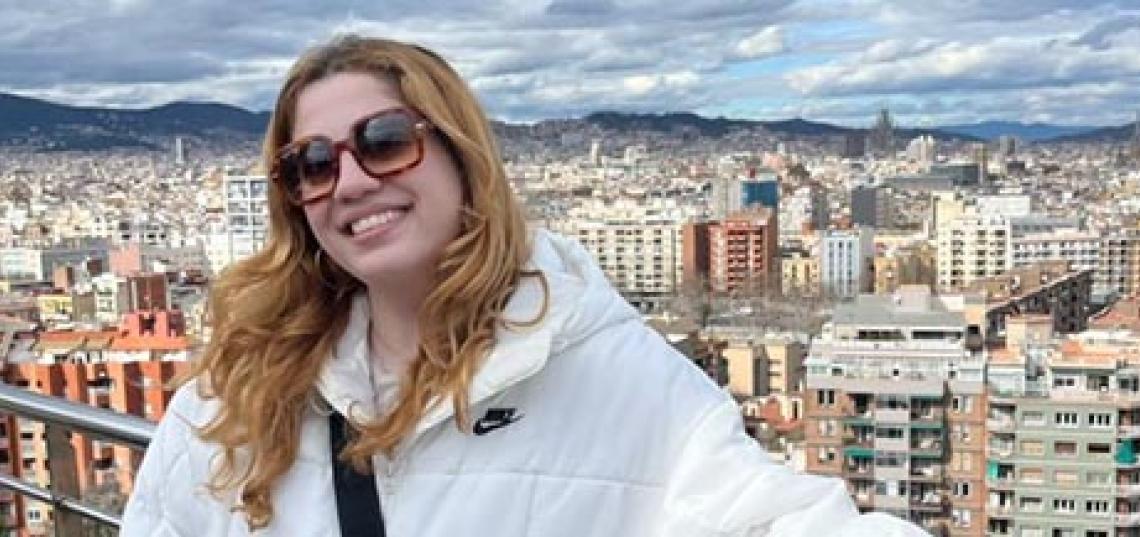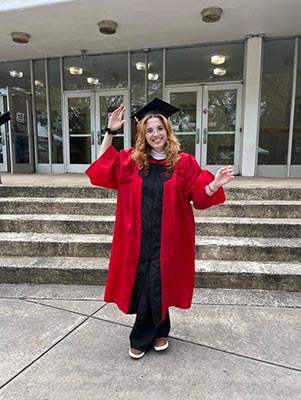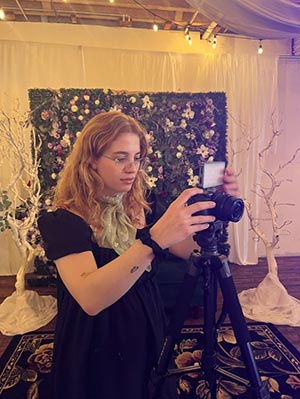
While she began to dream of working as a journalist as a young teenager growing up in Brazil, Marina Benitez JMS’24 said SC&I and Rutgers enabled her to gain the skills and experiences she needed to land her job as a reporter for the Financial Times. She was hired right after she graduated in May 2024.
Benitez, who majored in Journalism and Media Studies and minored in Gender and Media, said, “I had a concrete idea that I wanted to be a journalist since I was around 14 or 15. I've always been a writer, a reader, and a very curious soul. It just turned out that journalism was a really great fit for me. My passion for journalism ignited in college. I knew I was studying at one of the best journalism programs in the country, and at Rutgers I was able to practice journalism in a variety of formats: in my classes, at The Daily Targum, HERcampus, and WRSU.”
 Today, Benitez works full time at the Financial Times as a reporter for MandateWire, a publication under the Financial Times, which focuses on the world of finance where she covers institutional investors such as pensions, foundations, and endowments.
Today, Benitez works full time at the Financial Times as a reporter for MandateWire, a publication under the Financial Times, which focuses on the world of finance where she covers institutional investors such as pensions, foundations, and endowments.
In our Q&A with Benitez, she shares how her varied experiences at SC&I and Rutgers, as well as her internships, prepared her for her successful career.
SC&I: What were some of your favorite classes at SC&I?
MB: Coursework that was practical helped me prepare to do a lot of the work I do now. Taking Professor Erica Herskowitz’s class Broadcast Writing & Reporting was helpful, as was Film Production with Professor Neal Bennett, and Writing the Mediterranean with Professor Mary D’Ambrosio. The classes that got me out of the classroom and helped me learn by doing were the most important aspects of my coursework. I'm lucky to have been able to take many of those classes.
SC&I: Can you describe your role at Financial Times and how you've transferred the skills that you've learned from previous internships or the classroom?
MB: For my beat in MandateWire, I cover different institutional investors like pension plans, endowments, foundations, and family offices. My days are packed with reporting, writing, and seeking new story leads.
The great thing about my job is that it's strictly a 9-5. One would not expect that, being a journalism job, but it starts at nine and it ends at five. Nobody touches the phone during the weekend, my boss does not contact me. Everybody leaves at 5. We have a one-hour lunch every day. I also get to go to the New York City office twice a week or more if I want to, which is nice.
What helped me get this job was a finance internship I had right before I graduated. I interned at a company called GOBankingRates. It was a personal finance magazine, and I had never done an internship in the finance area before, but they hired me because of a previous internship, where I had experience writing brand content.
During my time at Rutgers, I had three internships starting with VUE New Jersey in my senior year, which was an unpaid internship. I also did another video and media journalism internship with We Are Jersey, which is a community culture magazine and media production company, which was really fun.
The internships prepared me for my career more than the classes. Showing you have experience working in the field to back yourself up when you're in a job interview is extremely important.
SC&I: What advice would you give a current or prospective SC&I student who's trying to figure out what they want to accomplish at Rutgers and how they want to get involved?
MB: Try to get involved as much as you can in college. The most important thing for a journalism student is to build your portfolio. Also, have a website you can show people. Every single job you're going to apply to has an open section for you to add your own portfolio on your own website, and that's very important. Besides that, obviously, your professors are the key source of everything.
Getting to know Professor Steven Miller is one of the reasons I got one of my internships because he wrote a recommendation letter. Professor D’Ambrosio convinced me to accept the personal finance job when I was in Spain taking her course, and that's the reason I got my job. Your professors and mentors are extremely important sources of ideas, connections, and recommendations.
LinkedIn is also key. I reached out to every single journalist in the city, at Bloomberg, the New York Times, the New York Post, and others. I connected with as many people as I could from the industry. And so every time I posted something, I knew people from the industry were looking.
SC&I: Is there anything else that you'd like to add?
MB: Don't forget to support your local newspaper, The Daily Targum. And be patient. Your time will come.
Learn more about the Journalism and Media Studies major at the Rutgers School of Communication and Information on the website.
Photos: Courtesy of Marina Benitez
